|
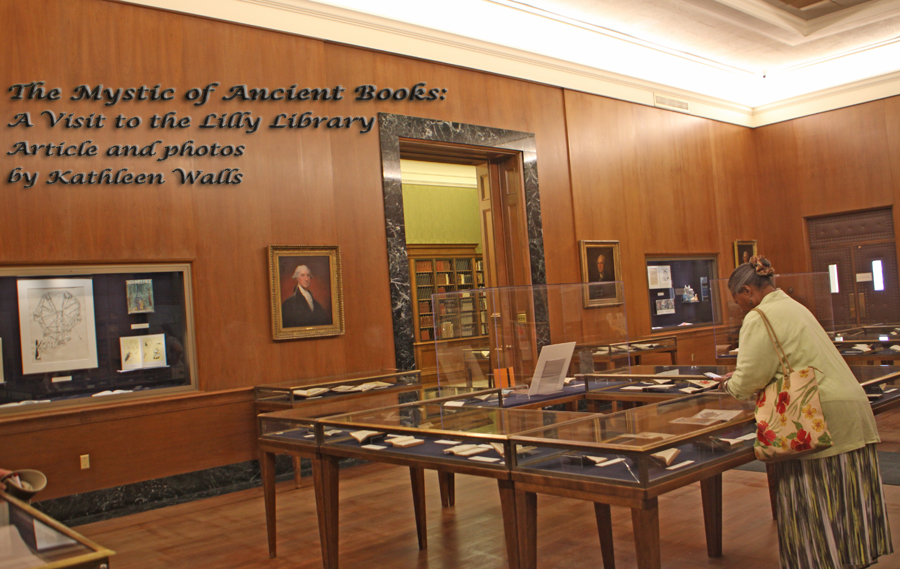 There is something captivating about books.
Even modern ones. When you touch a book, you touch many
different lives, the characters that inhabit the book as well as
the author who created the book. However, ancient books are even
more magical. I recently had an experience any book lover would
be thrilled to experience. I visited the Lilly Library on the
campus of Indiana University in Bloomington, Indiana. There is something captivating about books.
Even modern ones. When you touch a book, you touch many
different lives, the characters that inhabit the book as well as
the author who created the book. However, ancient books are even
more magical. I recently had an experience any book lover would
be thrilled to experience. I visited the Lilly Library on the
campus of Indiana University in Bloomington, Indiana.
Lilly Library contains over 400,000 books,
more than 100,000 pieces of sheet music, around eight million
manuscripts. If that
doesn't make any book lover drool I don't know what would. In
addition there are around 30,000 three dimensional puzzles from
the Jerry Slocum Collection. The puzzles are the newest addition
to the library. Mr. Slocum began collecting when he was eight
and he is now in his 80s. He wanted the puzzles to be used and
out there for people to see.
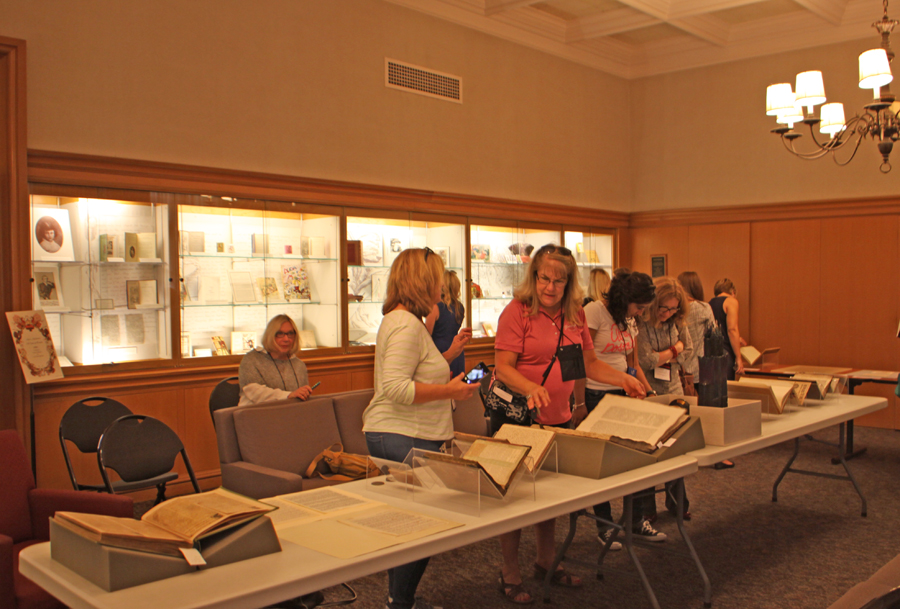 |
| A group of us browsing through
some of the treasures in the Lilly Library |
My visit to the Lilly Library
was the most amazing experience. Not only could I look at rare treasures
dating back to the middle ages, I could actually touch them. They showed us
the first printing of the
Declaration of Independence and the first printing of the
Bill of Rights. There
was Shakespeare's First
Folio printed in 1673 sitting right out on the same table
with a 1950s comic book.
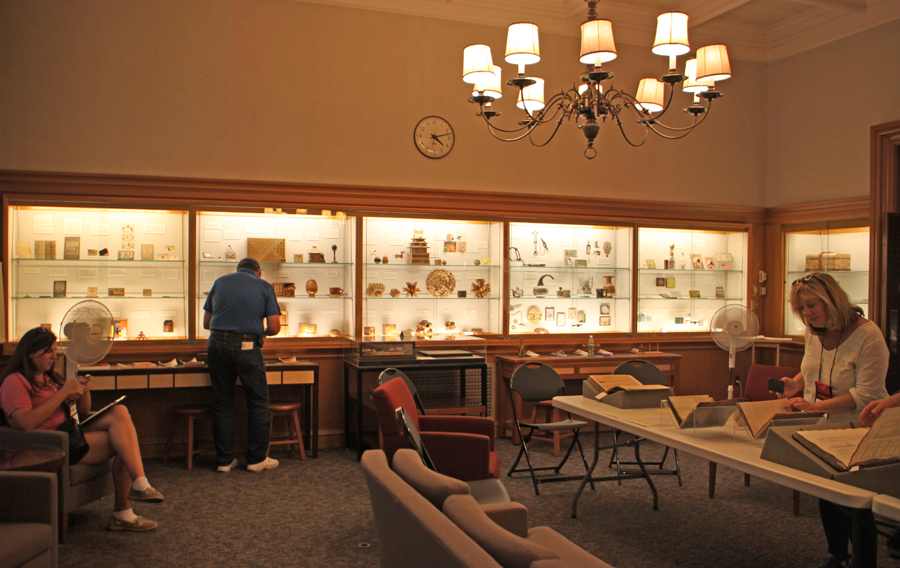 |
| A part of the puzzle collection |
Rebecca Baumann, Education and Outreach
Librarian, spoke to us about the library's beginning and
collections. The library
was opened in 1960 because of the donations of Josiah K. Lilly,
Jr., owner of Lilly Pharmaceuticals in Indianapolis. Mr. Lilly
had been a collector all his life and had an eclectic collection
which was the original collection of the library.
Rebecca explained how they are so different
than other libraries of this kind. "We are much more open and
accessible to the public. You
do have to register. Anybody can walk in and ask to see anything
we have in the collection and then they can see it in the
reading room."
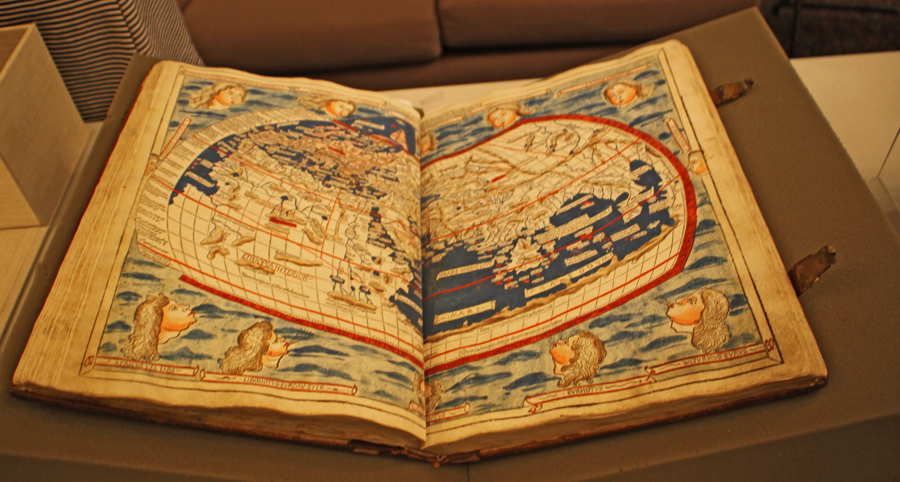 |
| One of the beautifully
illustrated books showing the world as it was percieved
in that era |
Roaming around that table was an experience
I will never forget. The tiny miniature children's book library
was designed for tiny hands. The 1517 German medical book about wound surgery on the battlefield will convince anyone they
did not want to go to a doctor in that era.
It had the first ever
illustration of an amputation. Ian Fleming's original manuscript
of Goldfinger is there for James Bond fans.
John Ford, the Hollywood director, donated
his collection to the library. You can pick up his Oscar for
best director. It's the only thing you do need to put on a glove
to handle. Rebecca explained the finish would wear off
otherwise. Surprisingly,
Rebecca told us that the old books were much more durable. She
pointed to the comic book and stated. "Those are the most
fragile pieces we have in the library. The reason being that the
oldest books and medieval manuscripts are not printed on paper.
They are on velum which is an animal skin not paper. They were
very expensive to make. Probably a whole flock of sheep went
into the Book of Hours."
She pointed to a beautifully illustrated book of illustrations.
"These were meant for only one person and were very expensive.
Whereas the comics were printed for thousands and very cheap."
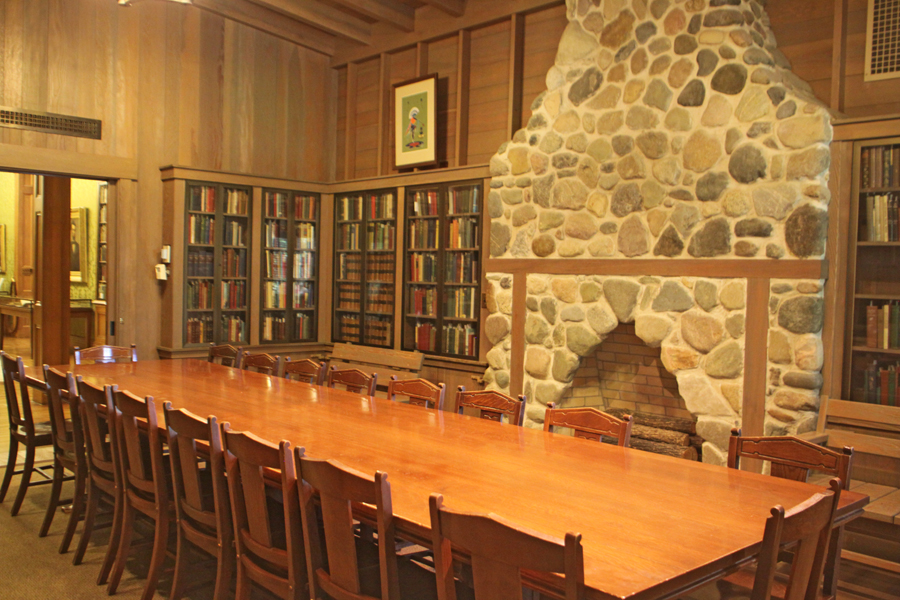 |
| One of the reading rooms |
There are a lot of Edgar Allan Poe first
editions along with a collection of letters he sent to his
fiancee, Sarah Helen Whitman. There was a lock of hair he had
sent to her. She made him promise to quit drinking. When she
found out he was still drinking, she broke it off. Poe sent a
final letter to her. She only kept a fragment which read, "I
blame no one but your mother."
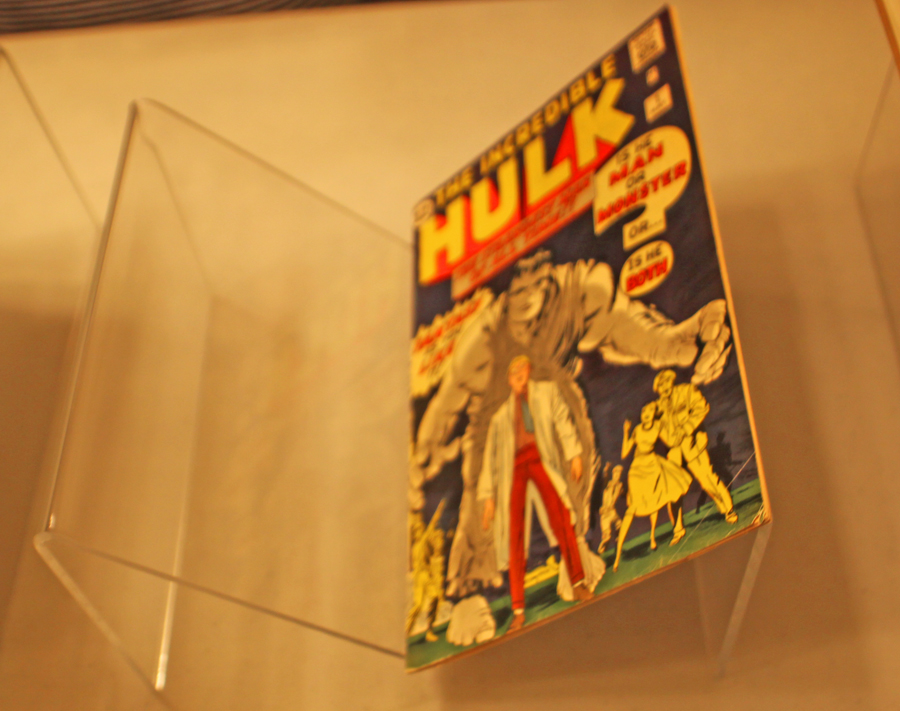 |
| The most fragile kind of book
in the library |
There were numerous travel journals since
we were all travel journalists.
One was a manuscript by a traveler, George Gibberon. He
describes his trip from England to Italy in 1824. He was worried
about running out of space so as you go through the pages, the
text becomes smaller and smaller. Towards the end I could not
even read it unless I had a magnifying glass Naturally, Indiana
journalists Ernie Pyle's books and draft versions were there.
Interestingly there were letters Pyle wrote to his wife and the
same event described to Paige Cavanaugh, his best friend. So
different!
Wandering throughout the library I was
surrounded by old friends. Books I remember reading as a
youngster and many I would love to read. They have the largest
collection of Abraham Lincoln books I have ever seen, some of
his letters and works and others written about him.
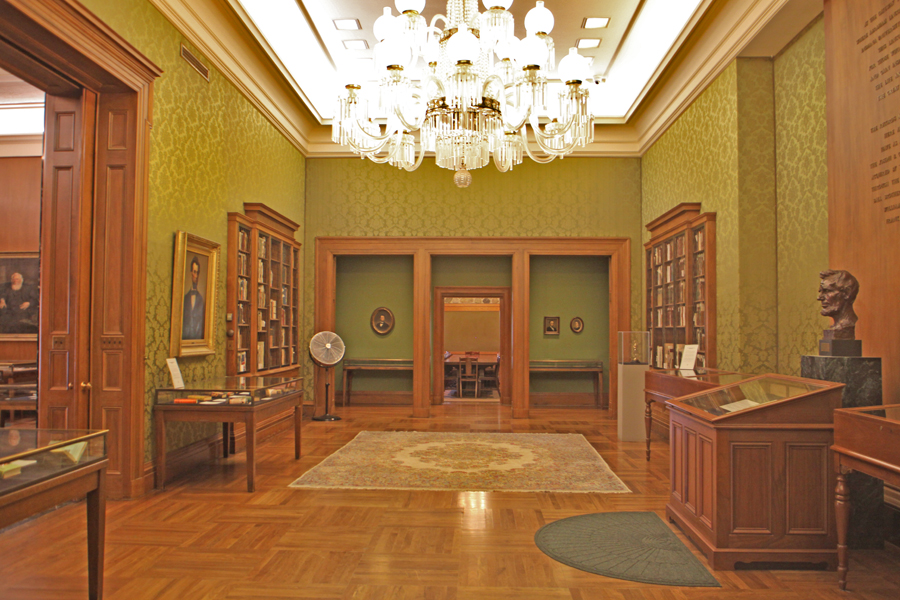 |
| Just a small portion of the
collections |
My biggest thrill was Thomas Jefferson's
own copy of the
Declaration of Independence. Rebecca explained that in that time, book sections were
lettered rather than numbered. Because of the similarity between
"I" and "j" the letter "j" was not used.
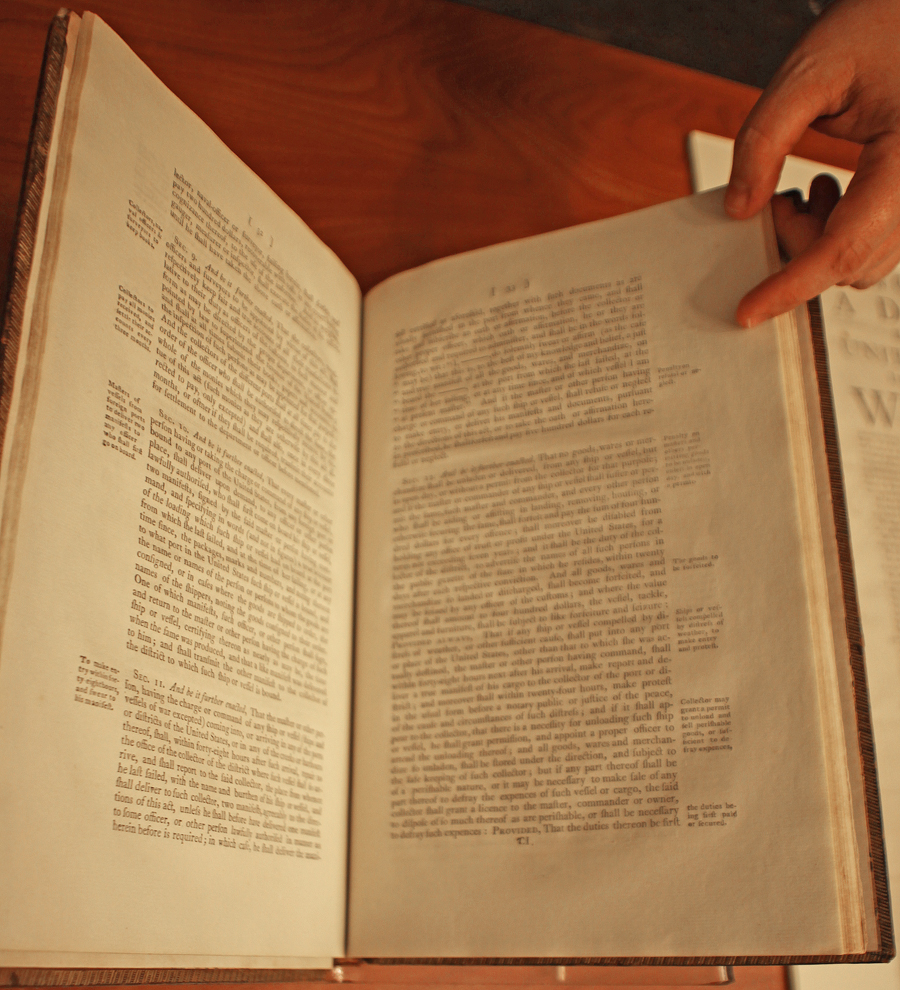 |
Thomas Jefferson's own copy of
the Declaration of Independence.
Look closely and
you can see where his wrote his initial in before the
"i" at the bottom of the page |
Thomas Jefferson had a habit
of marking any of his books on the "I" page by placing the
letter "t" in front of it.
There was another place in this book where he had
scratched out a work and made a correction. Touching that same
page that Thomas Jefferson touched so long ago was an experience
I will never forget.
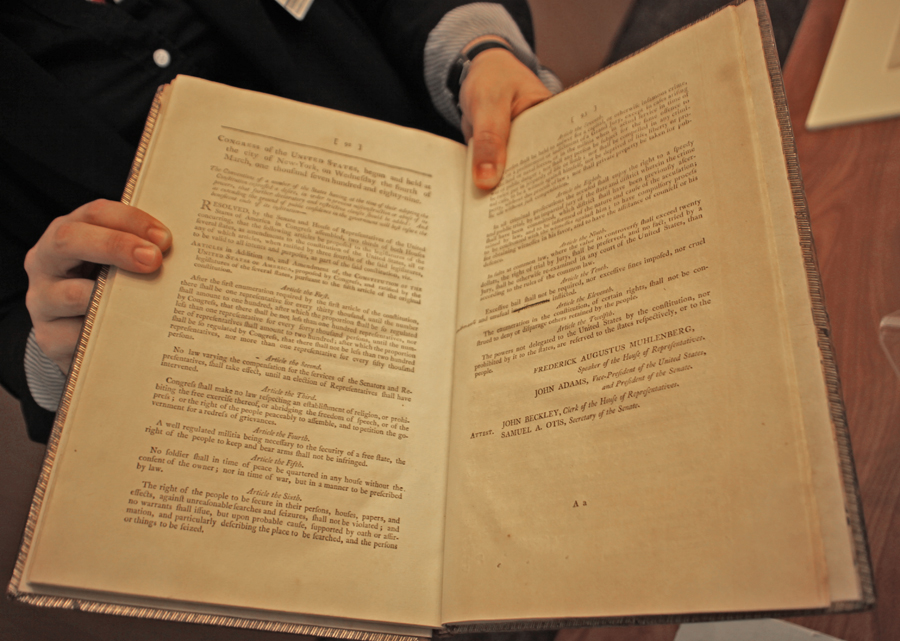 |
| Here you can see where Jefferson
made a correction in his copy of the Bill of Rights |
If you love books like I do and ever find
yourself in Indiana, allow plenty of time to visit this treasure
trove.
For more info:
http://www.indiana.edu/~liblilly/
|